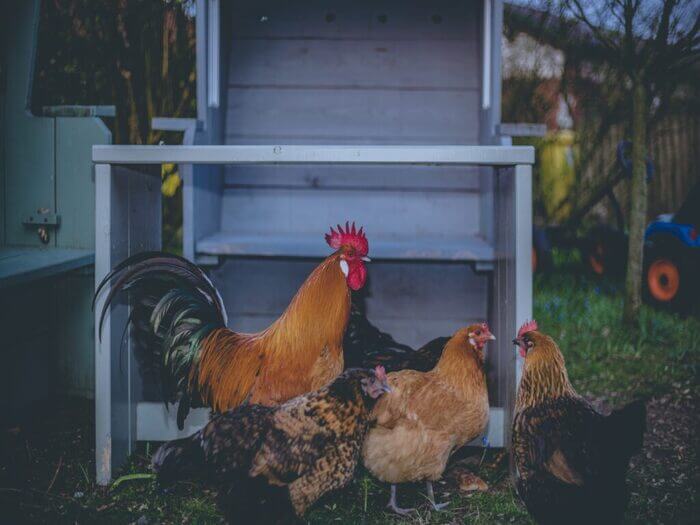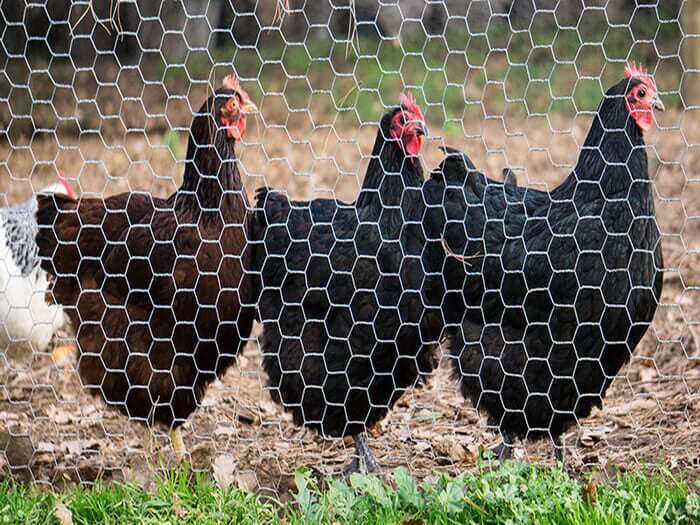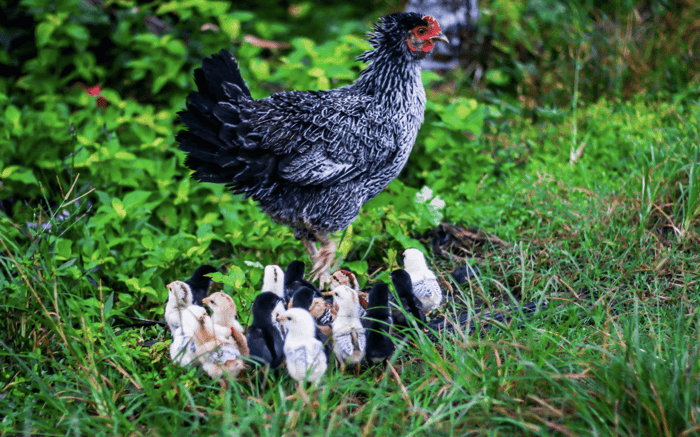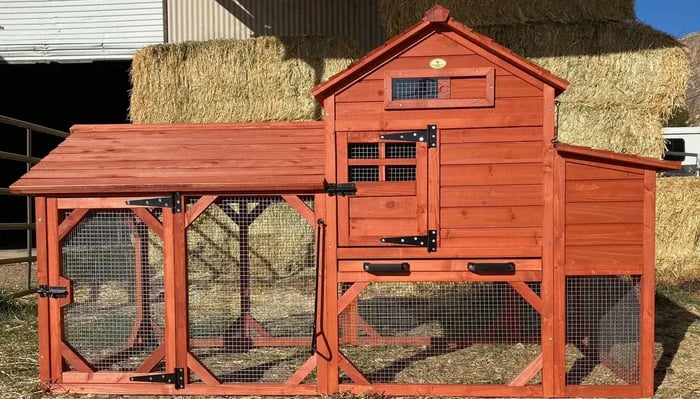Table of Contents
- Understanding the Predator Threat: Who’s After Your Chickens?
- Daytime Strategies: How to Protect Chickens From Predators While Free-Ranging
- Nighttime Protection: How to Protect Chickens From Predators After Dark
- Perimeter Security: Fencing and Barriers That Work
- Additional Tips to Protect Your Chickens From Predators
- Common Predator Behaviors and How to Counter Them
- Final Thoughts: Creating a Safe Haven for Your Chickens
- FAQs
One of the most important concerns for backyard poultry keepers is how to protect chickens from predators effectively, both during the day and at night. Raising chickens is a joyful and rewarding experience that brings fresh eggs and lively company to your backyard.
However, one of the biggest challenges chicken owners face is keeping their flock safe from predators. Whether it’s during the bright daylight hours or the quiet of night, predators are always on the lookout for an easy meal. Learning how to protect chickens from predators effectively is essential to ensure your birds stay healthy and safe.
In this comprehensive guide, we’ll explore proven strategies and practical tips to safeguard your chickens around the clock. From securing your coop to managing free-range time, you’ll discover everything you need to know to create a predator-
proof environment.
 Understanding the Predator Threat: Who’s After Your Chickens?
Understanding the Predator Threat: Who’s After Your Chickens?
Before diving into protection methods, it’s important to understand the types of predators you’re dealing with. Different predators hunt at different times and use various tactics to get to your chickens.
Raccoons: Nocturnal and incredibly clever, raccoons can open simple latches and squeeze through small gaps.
Foxes: Stealthy hunters that use digging and climbing to reach their prey.
Coyotes: Larger and more aggressive, coyotes can jump fences and dig under barriers.
Hawks and Owls: Birds of prey that attack from above, especially targeting young or small chickens.
Snakes: Slither through tiny openings to eat eggs or chicks.
Dogs and Cats: Domestic animals can sometimes pose a threat if they’re not trained or supervised.
Weasels, Skunks, Opossums, and Rats: Smaller predators that can infiltrate coops through tiny holes.
Knowing your local predators helps you tailor your protection strategies effectively.
Daytime Strategies: How to Protect Chickens From Predators While Free-Ranging
Many chicken keepers love to let their birds roam freely during the day. Free-ranging allows chickens to forage naturally, exercise, and enjoy fresh air. However, it also exposes them to daytime predators like hawks, dogs, and foxes. Here’s how to keep your flock safe while they’re out and about.
1. Provide Overhead Protection
Hawks and owls are some of the most common daytime predators. They swoop down quickly and can carry off unsuspecting chickens in seconds.
Cover the Run: Use strong hardware cloth or bird netting to cover your chicken run. This prevents aerial attacks and keeps your chickens protected while they forage.
String Wires or Twine: Crisscrossing wires or twine overhead can deter birds of prey by disrupting their flight paths.
2. Create Plenty of Hiding Spots
Chickens instinctively seek cover when threatened. Plant shrubs, bushes, or place wooden pallets and garden benches around the yard to give your flock places to hide.
Natural Cover: Native bushes or tall grasses provide excellent shelter.
Artificial Cover: Tunnels, low shelters, or even overturned crates can serve as quick escape spots.
3. Supervise Free-Range Time
Whenever possible, supervise your chickens while they’re outside. Your presence alone can deter many predators, especially neighborhood dogs or curious wildlife.
Use Guardian Animals: Some chicken owners use dogs trained to protect poultry or even geese, which can be surprisingly effective at alerting and deterring predators.
4. Use Visual and Auditory Deterrents
Reflective Objects: Hang old CDs, aluminum foil strips, or reflective tape around the run to scare away hawks.
Noise Makers: Wind chimes or motion-activated sound devices can startle predators and keep them at bay.
 Nighttime Protection: How to Protect Chickens From Predators After Dark
Nighttime Protection: How to Protect Chickens From Predators After Dark
Nighttime is when most predators become active. Raccoons, foxes, coyotes, and snakes use the cover of darkness to sneak into coops and run off with chickens or eggs. Protecting your flock at night is critical.
1. Secure the Coop and Lock Chickens Inside
The most important nighttime defense is to have a sturdy coop that locks securely.
Close the Coop at Dusk: Train your chickens to return to the coop before dark and lock the doors securely.
Automatic Coop Doors: Consider installing an automatic door that closes at dusk and opens at dawn to ensure no chicken is left outside.
2. Build a Predator-Proof Coop
Use Strong Materials: Build your coop with solid wood or metal. Avoid chicken wire, which is easy for predators to tear.
Cover All Openings: Use 1/4-inch hardware cloth on windows, vents, and other openings to keep out snakes and small predators.
Secure the Floor: Either use a solid floor or bury hardware cloth at least 12 inches deep around the perimeter to prevent digging predators.
Install Secure Latches: Raccoons are notorious for opening simple latches. Use two-step locks, carabiners, or spring-loaded latches that require two motions to open.
To further strengthen your coop’s defenses against digging and climbing predators, consider using a specialized Chicken Coop Predator Protection Kit. This kit includes heavy-duty wire mesh designed to attach easily around the coop’s base, effectively preventing raccoons, foxes, and other predators from gaining access.
3. Add Motion-Activated Lights and Alarms
Predators dislike sudden light and noise. Installing motion-activated lights or alarms around your coop can scare off nocturnal hunters.
Solar-Powered Lights: These are easy to install and don’t require wiring.
Noise Makers: Motion-triggered alarms or radios can add an extra layer of deterrence.
4. Use Electric Fencing for Added Security
If you live in an area with persistent predator problems, electric fencing can be a game-changer.
Perimeter Fence: Surround your coop and run with a low-voltage electric fence to keep out foxes, coyotes, and raccoons.
Safety First: Always follow manufacturer guidelines and local regulations when installing electric fencing.
 Perimeter Security: Fencing and Barriers That Work
Perimeter Security: Fencing and Barriers That Work
A strong perimeter fence is your first line of defense against many predators.
1. Choose the Right Fence Material
Hardware Cloth: Use 1/2-inch or smaller hardware cloth rather than chicken wire.
Fence Height: Make fences at least 5-6 feet tall to deter jumping predators.
Bury the Bottom: Bury fencing 12-18 inches deep or create a wire apron extending outward to prevent digging.
2. Regular Inspections and Maintenance
Predators are persistent and will exploit any weakness.
Daily Checks: Inspect the fence for holes, loose wires, or signs of digging.
Repair Promptly: Fix any damage immediately to maintain security.
Additional Tips to Protect Your Chickens From Predators
When learning how to protect chickens from predators, one of the most effective methods is securing the coop with hardware cloth.
1. Collect Eggs Frequently
Eggs attract snakes, rodents, and other predators. Collect eggs at least once or twice a day to minimize this risk.
2. Remove Food at Night
Leftover feed can attract unwanted visitors. Use feeders that close at night or remove feed from the run after dark.
3. Keep the Area Clean
Remove fallen fruit, compost piles, and trash that might attract wildlife near your coop.
4. Use Trail Cameras
Set up wildlife cameras to monitor predator activity. Knowing which predators are active can help you adjust your defenses.
5. Work With Neighbors
If you live in a community, coordinate with neighbors to keep pets restrained and share information about local predator sightings.
Common Predator Behaviors and How to Counter Them
| Predator | Active Time | Behavior | Best Defense |
|---|---|---|---|
| Raccoons | Night | Opens latches, climbs, digs | Secure latches, hardware cloth |
| Foxes | Night/Day | Digs under fences, jumps fences | Bury fencing, tall fences |
| Coyotes | Night | Jumps fences, digs | Electric fencing, tall fencing |
| Hawks/Owls | Day/Night | Aerial attacks | Covered runs, overhead netting |
| Snakes | Night | Slips through small holes | 1/4-inch hardware cloth |
| Dogs | Day | Chases and kills chickens | Supervision, tall fences |
Final Thoughts: Creating a Safe Haven for Your Chickens
Knowing how to protect chickens from predators is about combining multiple layers of defense. A sturdy, well-secured coop, strong perimeter fencing, careful daily routines, and predator deterrents all work together to keep your flock safe.
Predators are clever and persistent, but with patience and vigilance, you can outsmart them. Your chickens will thrive in a secure environment, giving you the joy and satisfaction of a happy, healthy flock.
Start implementing these strategies today, and enjoy the peace of mind that comes with knowing your chickens are protected day and night.
By following these tips on how to protect chickens from predators, you can ensure your flock remains safe and healthy year-round.
FAQs
How can I protect my chickens during the day?
To protect chickens during daylight, provide overhead netting or hardware cloth to block aerial predators, supervise free-ranging, and add hiding spots like bushes or shelters in the yard.
How do I keep my chickens safe at night?
Lock chickens inside a sturdy coop with secure latches before dark. Use hardware cloth to cover openings, bury fencing to prevent digging, and consider motion-activated lights or alarms.
Can a rooster protect my flock from predators?
Roosters can alert hens to danger and sometimes fend off small threats, but they can’t stop all predators. Additional coop security is necessary to protect your flock fully.
Are electric fences effective for chicken protection?
Yes, electric fences are a strong deterrent, especially in rural areas with frequent predator activity. They should be installed safely and according to local guidelines
How often should I inspect my coop and fencing?
Inspect your coop and fencing weekly for holes, damage, or signs of digging. Repair any weak spots immediately to maintain security.
What should I do if a predator attack happens?
Assess the damage, reinforce weak areas, remove food and egg attractants, and consider adding deterrents like motion-activated lights or guardian animals to prevent future attacks.


.png)


